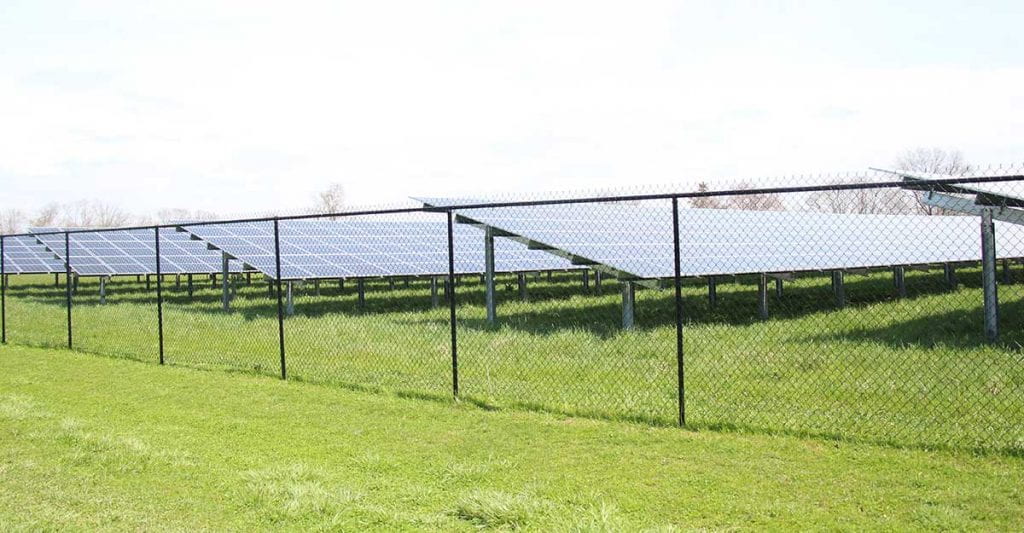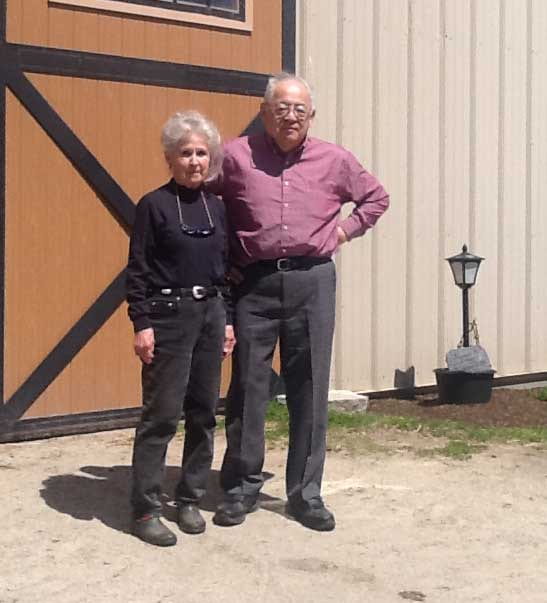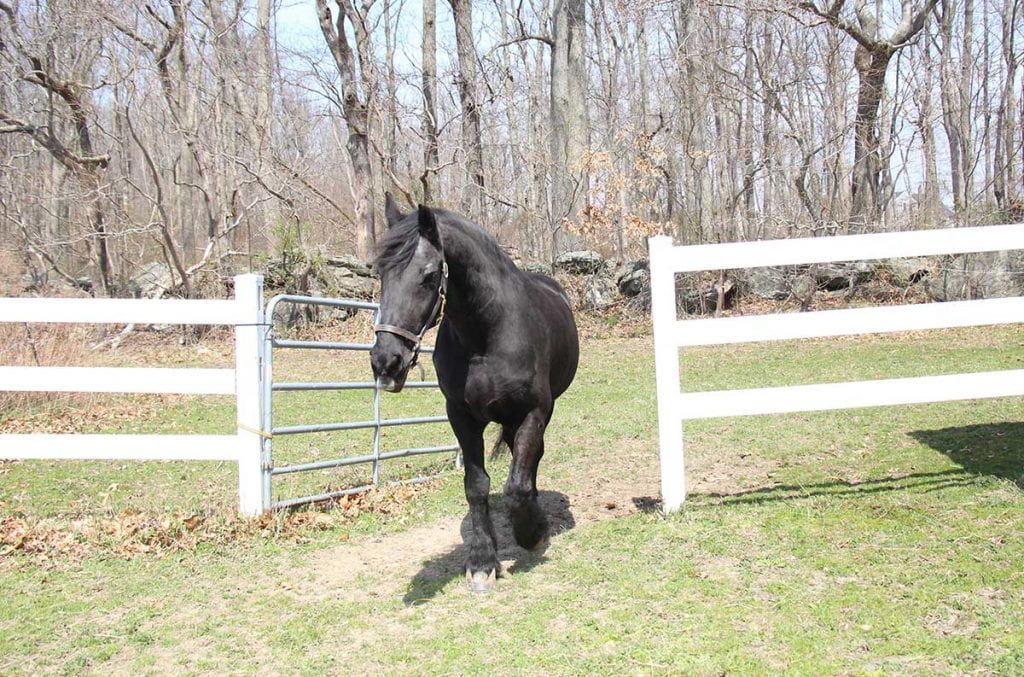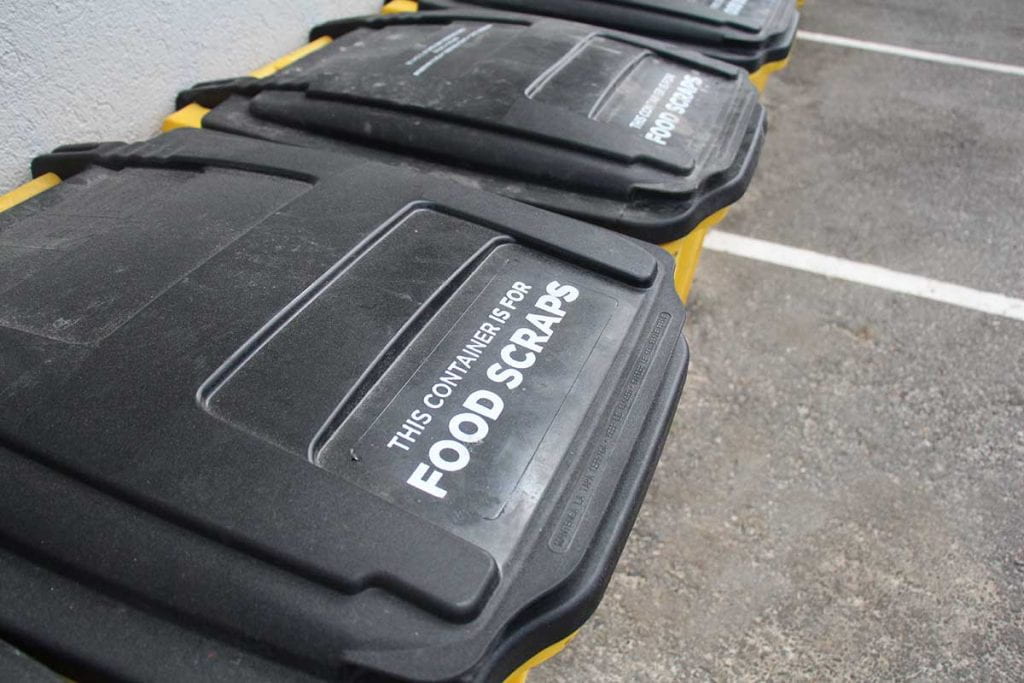May 04, 2022
Solar project at horse farm helps Providence College save on energy consumption
By Maeve Hickey ’21, ’22G
Seventeen miles from Providence College, down long residential roads of perfectly spaced one-acre lots in Warren, R.I., you will find Blackhorse farm — and PC’s largest sustainable energy initiative to date. Blackhorse farm, a family-owned horse farm, is home to a 3,750,000-watt solar generation unit, from which PC is the sole beneficiary.
Blackhorse Farm Solar, LLC, which came online in December 2020, produced more than 5.5 million kilowatts of solar power in its first year, resulting in $222,976 in savings for PC. This energy production offsets approximately 26% of the college’s annual energy consumption.
Kevin Stacom ’74, the former Friar basketball star and Boston Celtics player who now is a consultant and lobbyist in Rhode Island, reached out to John M. Sweeney, PC’s senior vice president and chief financial officer, about the partnership with Blackhorse Farm Solar in 2019.
PC had been making strides in its energy efforts for several years and had been looking for a project that would considerably minimize the college’s carbon footprint.
“We wanted a green project that would actually make a difference, not just a project that would make us feel good,” said Sweeney. “It had to make sense for us as an institution and be worthwhile.”

The project required approval from the Rhode Island Public Utilities Commission and the Warren Zoning Board, which unanimously supported it. The solar farm creates no significant noise, dust, or odor, and does not produce any hazardous material. Its minimal impact on the environment, as well as its ability to provide an impactful renewable energy, led to its approval in June 2020 after six months of study.
The project consists of 11,394 solar panels covering about 10.5 acres of farmland. It takes up a total of 20 acres of Blackhorse farm’s 50-acre lot in Warren. Each panel can generate up to 345 watts of electricity.
“Just like we try to be good neighbors here on Smith Hill, we try to be good neighbors wherever our solar facilities are located,” said Sweeney. “We were working with good people, and they had designed a good project with minimal impact to the surrounding neighborhood.”
Blackhorse farm is a family business that houses seven retired show horses. It is owned by Patricia and Alexander Joe. The Joes, who are the parents of Matthew A. Joe ’95 and Stephan P. Joe ’98, have run the day-to-day operations of boarding horses for 21 years. As they near retirement, the partnership could not have come at a better time.

The Joes were approached by Energy Development Partners, the project developer, about the partnership. Coincidentally, they had been considering installing wind turbines on the farm, so they were immediately interested in another way to help the sustainability movement through the use of their land.
“At first, I was hesitant to give up all that land, but it has been so beneficial for everyone involved,” said Patricia Joe. “This partnership has allowed me to keep the farm running.”
The partnership allows the Joe family to carry on farm operations and be financially profitable, since they are able to use rental income from the solar farm to offset farm expenses. The land occupied by solar panels was previously used to grow hay for the horses. The hay still grows beneath the panels and is trimmed by personnnel from AES, the owner of the solar park, so the family does not have any responsibility other than farm operations.
The panels are enclosed by a tall chain-link fence. Patricia Joe noticed that wild turkeys fly into the enclosure to seek refuge from predators, so she nicknamed the solar farm “the turkey nursery.”
Even after retirement, the Joes will continue to reap the benefits of the partnership for the next 25 years.

Steven J. Maurano ’78, associate vice president for public affairs, government, and community relations at PC, said the project has been beneficial to both the college and the Joes.
“Providence College strives to be a good community citizen in all that we do. So, at a time when many solar developments are being opposed and criticized due to where they are sited, deforestation, and other issues, we were especially pleased to work with our partners and the Joe family, who developed this project on their farm,” said Maurano. “And the fact that we would be helping their farm business while lessening our dependence on fossil fuels made this a win-win for all concerned.”
PC began exploring solar energy possibilities in 2017, but it was difficult finding a project where the benefits would outweigh the costs, Sweeney said. For the project at Blackhorse farm, PC did not invest upfront. Instead, the project developers share in the rebate paid to the school by National Grid.
The energy produced by the farm goes into National Grid’s system. The energy is then measured and recorded, and PC is given a credit toward its energy bill for that month. The project allows the college to continue to make a positive impact on the environment while continuously saving money on energy consumption.
“We felt that this project had a great potential to be successful, and we were right,” said Sweeney.
The college also is involved in two more solar energy partnerships in Rhode Island, at the Naval station in Newport and in Exeter. They should be fully operational by the end of 2022 and would result in an increase in the college’s total electricity savings to 45% each year, according to Sweeney. When all programs are operational, the electricity produced by the power of the sun will offset more than 85% of the college’s regular consumption.
The Naval station undertaking includes partnerships with several other Rhode Island colleges, all of which will benefit from the solar energy produced.

In other sustainability initiatives, Providence College also performed lighting upgrades in 10 residence halls last summer. The upgrade included installation of energy efficient light bulbs and occupancy sensors, so lights will only be on when they are needed.
During the pandemic, the college realized the increased need for air filtering in residence halls, but that increased electrical use to power air conditioning and heating units. The college completed a project in 2021 to use generators to power air conditioning systems for several hours a day. This energy shift creates a reduction in use that will continue to result in more than $160,000 in annual revenue to the college from the National Grid demand response program.
The college has also recently integrated a compost pilot program at Raymond Dining Hall. In a partnership with the student-led group Environmental Club of PC, the college captures the spoils from food preparations and delivers the waste to an anaerobic compost digester in Johnston. The biogas from the digester produces electrical output that runs to the nearby composting plant. This also helps alleviate overflow problems in Rhode Island’s only landfill.
Individuals also can help reduce the carbon footprint through small daily habits — unplugging electronics when they’re not in use, using natural light when possible, and taking reasonably timed showers, for example.
“Projects like the solar farm make an impact on a macro level, but in the end, every individual needs to be thinking about ways they can minimize their own environmental impact,” said Sweeney. “We all have a responsibility to be more environmentally conscious in how we live our lives.”





